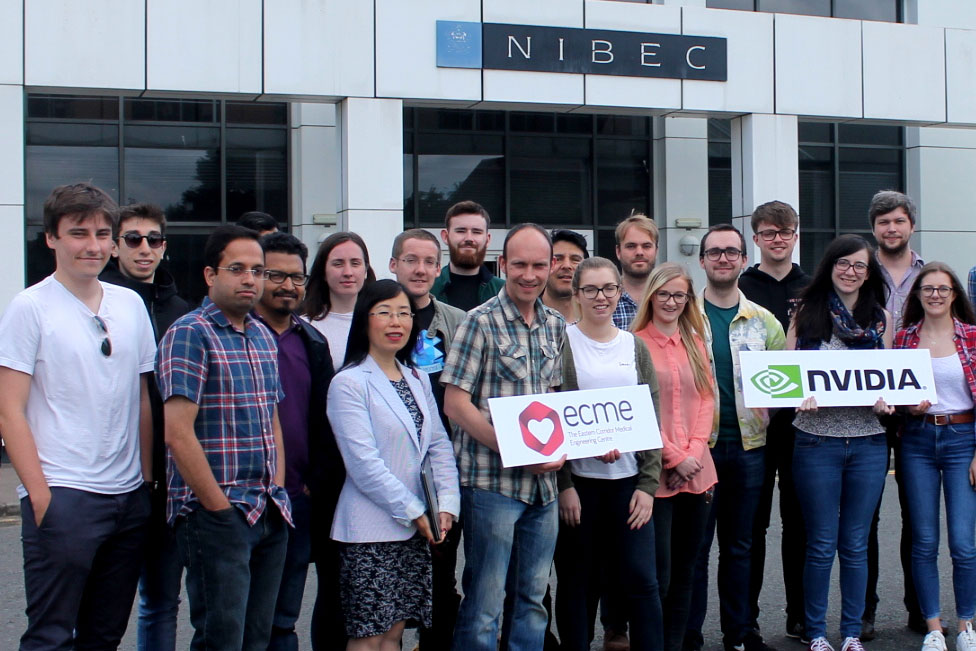Ulster University Collaborates with NVIDIA to Strengthen Health Sector in Northern Ireland
New agreement will strengthen collaboration on the Belfast City Deal, specifically around the new proposed Centre for Digital Healthcare Technology (CDHT)
Jul 7, 2020
Ulster University today announced it has signed a Memorandum of Understanding (MOU) with NVIDIA, a California-based accelerated computing company and a pioneer in artificial intelligence (AI) and machine learning (ML), to collaborate on accelerating the understanding, usage, and deployment of AI into healthcare and life sciences sectors.
Northern Ireland is a key hub for innovation in healthcare with an active startup community, internationally recognised universities and a forward-thinking healthcare system looking to bring areas of innovation directly to the point of care.
The University’s collaboration with NVIDIA brings knowledge in the latest technology tools, both hardware and software, and techniques to be able to develop and deploy these innovations to improve patient outcomes across the health service.
The new relationship is moving forward with a number of potential projects around the Belfast Regional City Deal being discussed, including a new Centre for Digital Healthcare Technology (CDHT).
NVIDIA is already supporting a number of local AI healthcare startups through the NVIDIA Inception virtual accelerator program, including Ulster University spin-in, PulseAI.
“Ulster University continues to lead in many areas of digital healthcare research, and this new strategic collaboration with NVIDIA will help accelerate new discoveries, new technologies and ultimately lead us to a new level of game-changing breakthroughs in medical technology and software,”
said Professor Jim McLaughlin, Head of the School of Engineering at Ulster University and Director of NIBEC.
“It’s a challenging and exciting time for healthcare research and this initiative will ensure that Ulster University will continue to work with the leading technology specialists wherever they are in the world.”
“NVIDIA is working to support the acceleration and adoption of AI into clinical workflows, supporting patient management and outcomes,” said Craig Rhodes, EMEA Healthcare at NVIDIA. “Our collaboration with Ulster University and Professor Jim McLaughlin, who has been fundamental in bringing our two organisations together, includes broad support through our Inception program for local startups in Northern Ireland working to develop AI and deploy it at the point of care.”
Proposed Collaborative Project: Centre for Digital Healthcare Technology (CDHT
The CDHT will be a high visibility centre for digital technology with associated living labs in the areas of cardiology, diabetes, respiratory and stroke.
The proposed project will see the development of an integrated three-way co-creation platform that will include private sector, university, and hospital health professionals in the health and life sciences sector. It will accelerate productivity opportunities for improved healthcare pathways and will support the development of commercial market solutions.
The CDHT will act as a hub for NVIDIA in Northern Ireland and Ireland. From there it will foster startups through NVIDIA Inception, establish new research strategies and develop new go-to-market Strategies together with Ulster University. The Northern Ireland AI community will also have AI training support through the NVIDIA Deep Learning Institute.
NVIDIA Supports Northern Ireland AI Startup through its Inception Program
PulseAI is a medical technology startup company focusing on early detection and treatment of cardiovascular disease using AI. They are currently developing a range of products for remote electrocardiogram monitoring (ECG) for the European and US healthcare markets.
The company is led by former Ulster University PhD student, Dr. Alan Kennedy, and is a member of NVIDIA Inception. The company has also recently spun in to Ulster University’s NIBEC (Nanotechnology and Integrated Bioengineering Centre) hatcheries programme, which allows them to work directly with some of the centre’s leading data scientists and ECG specialists.
Dr. Kennedy was full of praise for the benefits NVIDIA Inception has brought to PulseAI:
“NVIDIA Inception has really assisted PulseAI in three ways – giving us access to leading-edge NVIDIA GPU hardware to develop and test our algorithms, access to the expertise available through the NVIDIA Deep Learning Institute and, just as importantly, great business development and go-to-market support that has helped us improve our marketing and investor-readiness skills. NVIDIA Inception is a great way for new AI companies such as PulseAI to develop both technically and strategically.”